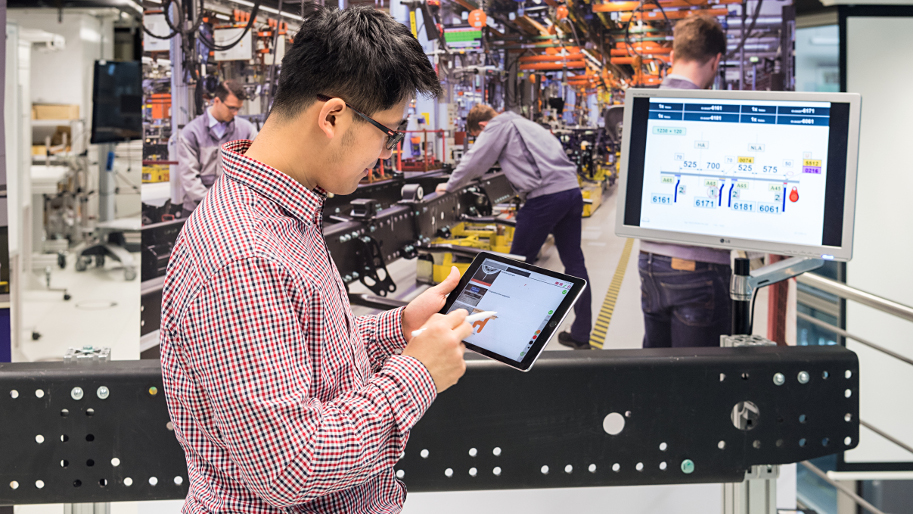“Knowledge Sharing Is Important”
 © Uli Benz/TU Muenchen
© Uli Benz/TU Muenchen
Professor Klaus Bengler, holder of the Chair in Ergonomics at the Technical University of Munich and president of the Gesellschaft für Arbeitswissenschaft (the German Ergonomics Society), talks about the exchange between science and business – and between humans and machines.
Professor Bengler, why do science and business need each other to successfully meet the challenges posed by the digitization of our working world?
The digitization of the world of work is characterized by an extraordinary pace of innovation. At the same time, we are seeing in the field of ergonomics that certain basic principles of human information processing and labor organization are being preserved, irrespective of the various technologies. So which approaches should the digitization of the working world now be based on? Scientific expertise is needed to answer this question, not only when it comes to designing software and forms of work, but also when it comes to training people in new working methods. Universities can systematically study these issues and provide a valuable external view because they are independent of the operational processes in question. In turn, it is important for universities to familiarize themselves – through an exchange with industry – with specific applications as paradigms, and to repeatedly base their scientific work on these practical examples.
How exactly does this interplay work?
This exchange between science and business plays a vital role in innovative fields such as human-robot collaboration and driverless vehicles in the automotive industry. Those responsible for vehicle automation have little or no contact with robotics specialists, and vice versa. Universities are very important as information hubs and places to meet and discuss different fields of application. From a university perspective, we are focusing on the fundamental “rules of the game” for human-robot collaboration. How do we deal with human movement? Which movements do humans expect from machines that are able to move themselves? We attempt to find general rules that are valid in all possible applications. I see excellent cooperation between the different actors in business and science when it comes to the development of research and validation methods, for example, for the training of intelligent algorithms and the recognition of human states.
Your university, the Technical University of Munich (TUM), emphasises its role as an “entrepreneurial university”. What does that mean?
The term entrepreneurial university refers to a university that bases its activities on a canon of values – a university that seeks to achieve social impact rather than merely pursuing academic studies for their own sake. With a view to designing future concepts for the interaction between humans and technology, the TUM offers, among other things, a master’s degree course in Human Factors Engineering that is extremely popular with international students. This, of course, also gives rise to contact with numerous research institutions. In an exchange with international students and scientists, knowledge sharing is important on the one hand. At the same time, however, one needs to develop a clear sense of the value systems and framework conditions under which work takes place in other cultural or economic domains.
Which international trends are you observing?
I have the impression that the issue of digitization of the working world is being addressed at various speeds in other countries – not to mention with different goals and different values. One reason why German industry is so successful worldwide is that it has long been implementing digital processes. Digitization is driven forward, not least for economic reasons, by companies asking themselves which innovations they need to be internationally competitive. In demographic terms, for example, Japan is under greater pressure than Europe or countries with a young population such as those in South America and Africa. Germany has already achieved a very high standard of digitization, with many small and medium-sized businesses having already found digital solutions. When discussing digitization with international representatives of science and business, I am repeatedly struck by the degree to which Germany is valued. This applies especially to the ease of access to universities here, but also to our highly vocational dual-education system.
Technical University of Munich: an internationally valued partner
At the end of April 2018, Reuters ranked the Technical University of Munich (TUM) the sixth most innovative university in Europe – and for the third consecutive time one of the continent’s top ten universities. This is just one of many international accolades for this first-class German university, which is regarded as one of Germany’s outstanding institutions of higher education thanks to its strengths in applied research. As such it is a valued partner, not only in the German TU9 initiative, but also due to its international representations and collaborations. No fewer than three of the German Centers for Research and Innovation count the TUM among their main supporters: the DWIH New Delhi, the DWIH New York and the DWIH São Paulo.
In India, the TUM’s activities include co-organizing the DWIH “Science Circle Lecture” and “Young Innovators” dialogue. And in Brazil, the TUM stepped up its cooperative ventures in 2018 – its 150th anniversary year. A trinational collaboration was established with the Universidade Estadual Paulista “Júlio de Mesquita Filho” (UNESP) and the University of Queensland (UQ), its Australian partner university, with a view to creating a global alliance in the bio-economy.
